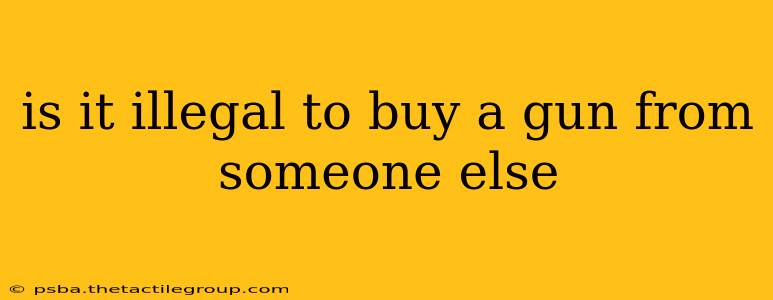Is It Illegal to Buy a Gun from Someone Else? A Comprehensive Guide to Private Gun Sales
The legality of buying a gun from a private seller varies significantly depending on your location. There's no single, straightforward answer, and navigating this complex legal landscape requires careful consideration of federal, state, and sometimes even local laws. This guide provides a general overview, but it's crucial to consult with legal counsel or your local law enforcement agency for definitive answers specific to your situation.
Federal Regulations: The Gun Control Act of 1968
The Gun Control Act (GCA) of 1968 establishes a framework for regulating firearms at the federal level. Key aspects relevant to private sales include:
- Licensed Dealers: Federally Licensed Firearms Dealers (FFLs) are required to conduct background checks through the National Instant Criminal Background Check System (NICS) on all firearm purchases. This includes sales to individuals who aren't already known to the dealer.
- Private Sales Loopholes: The GCA contains loopholes that generally exempt private citizens from conducting NICS background checks when selling firearms to other private citizens. However, this exemption doesn't erase other legal requirements, and the specifics vary significantly by state.
State Laws: A Patchwork of Regulations
State laws regarding private gun sales differ dramatically. Some states have mirrored the federal regulations, creating relatively few restrictions on private transfers. Others have implemented stricter rules, requiring background checks, permits, or registration for all firearm transfers, regardless of whether the sale involves an FFL.
Key Differences Among States:
- Background Check Requirements: Some states mandate background checks for all firearm transfers, including private sales. These often utilize state-level systems similar to NICS.
- Permitting Requirements: Certain states require firearm owners to possess a license or permit to purchase or possess firearms. Private sales often fall under these permitting requirements.
- Registration Requirements: Some jurisdictions have firearm registration laws, requiring owners to register their firearms with the state. This can complicate private sales as both the buyer and seller may be affected by the registration requirements.
- Prohibited Transfers: Regardless of state laws on private sales, most states prohibit the sale of firearms to individuals who are legally prohibited from owning them (e.g., convicted felons, individuals with certain mental health conditions).
Local Ordinances: Adding Another Layer of Complexity
Beyond state regulations, some cities and counties have enacted their own firearm ordinances that may further restrict private gun sales. These local laws can be difficult to navigate and can add yet another layer of complexity to the process.
Understanding the Risks of Illegal Gun Sales:
Buying or selling a firearm illegally carries significant risks, including:
- Criminal Charges: Violating federal or state gun laws can result in felony charges, leading to substantial fines, imprisonment, and a criminal record.
- Civil Liability: If a firearm sold illegally is later used in a crime, the seller could face civil lawsuits from victims or their families.
- Confiscation of Firearms: Law enforcement may seize firearms involved in illegal sales.
Conclusion: Seek Legal Counsel
The legality of buying a gun from someone else is a nuanced and complex issue. This information is for educational purposes only and does not constitute legal advice. It's absolutely vital to consult with a legal professional or your local law enforcement agency to determine the specific laws applicable to your location and situation before participating in any private firearm transaction. Ignoring the legal framework surrounding firearm transfers can lead to serious legal consequences.

